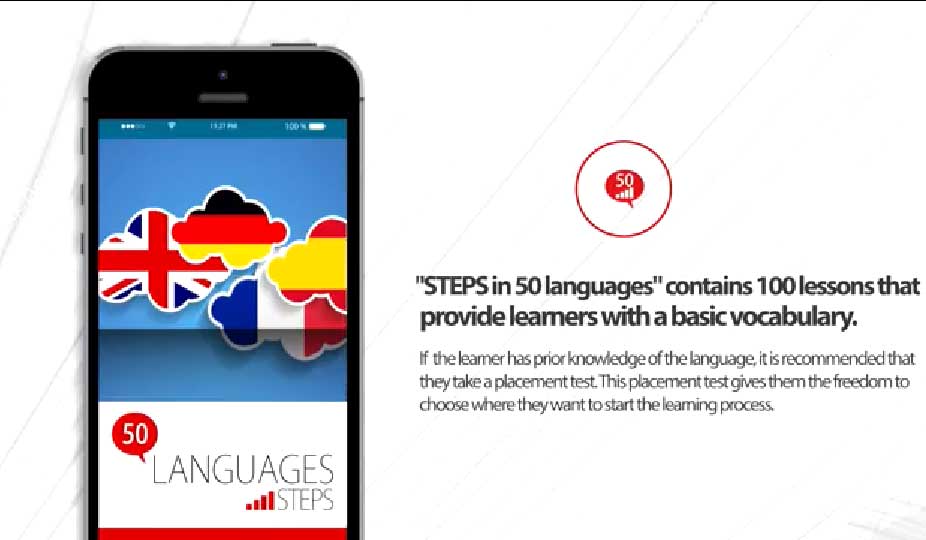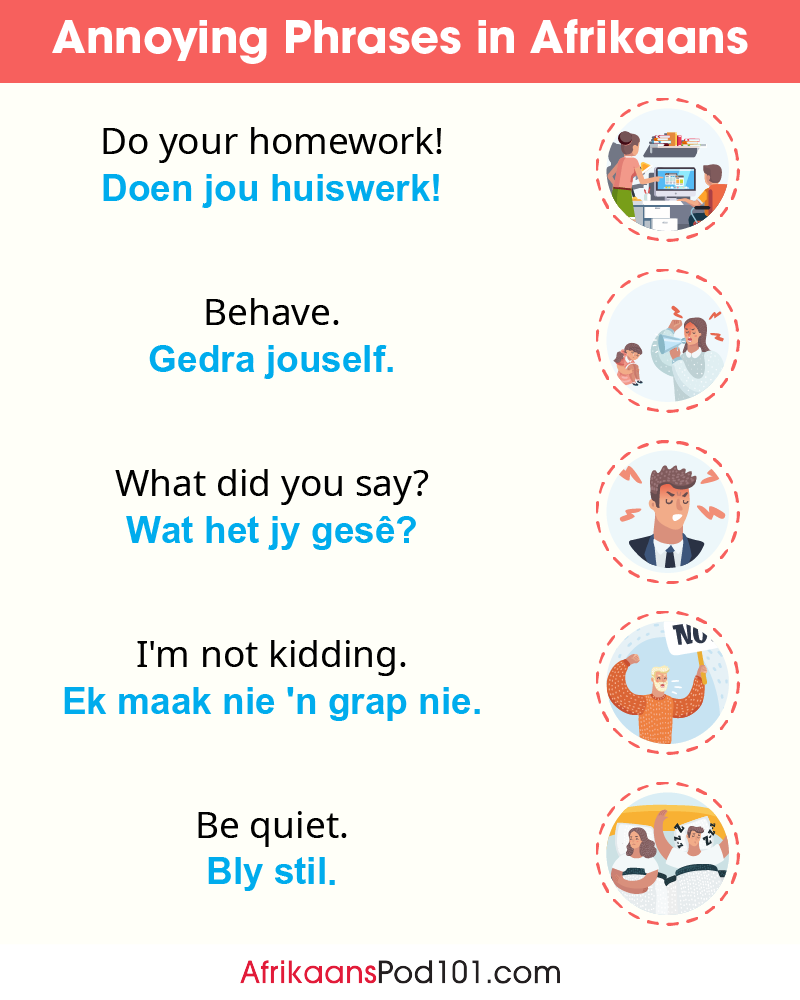2020. 11. 4. 08:01ㆍ카테고리 없음
Afrikaans I Tutorial: Basic Phrases, Vocabulary and Gr. Learn Afrikaans Online. Free Afrikaans Lessons.pdf.
Learn Afrikaans with these useful resources from around the web.
There’s never been a better time to learn a language. No matter your age or experience, a plethora of tools and resources are available to get you started or help you improve your language skills.
Best of all, many of these resources are completely free.
Check out the links below to jump-start your Afrikaans.
Contents

General
| Omniglot - Basic overview of Afrikaans with alphabet and useful links |
| Wikipedia - Overview of the Afrikaans language |
| Open Languages - Grammar and vocab |
| Easy Afrikaans - Lessons on grammar and vocab |
| Reddit - /r/afrikaans - discussions and native material |
Free Courses
| Colloquial Afrikaans - Download PDF |
| Teach Yourself Afrikaans - Download PDF |
Paid Courses

| Amazon - Afrikaans language learning materials |
Phrases
| Surface Languages - Basic Afrikaans phrases with audio |
| Wikivoyage - Afrikaans travel phrases (no audio) |
Dictionaries and Translation
| Google Translate - Translate to and from Afrikaans |
| Rieme.co.za - Die Afrikaanse soekmasjien |
Grammar and Vocabulary
| Forvo - Collection of Afrikaans words pronounced by native speakers |
| Wikipedia - Afrikaans grammar |
| Memrise - Spaced repetition site and app for learning Afrikaans vocabulary |
| Verbix - Afrikaans verb conjugation tool |
| Open Languages - Grammar and vocab |
| Easy Afrikaans - Lessons on grammar and vocab |
| Grammar of Afrikaans - PDF with exercises |
| Digital Dialects - Games to learn vocab |
Video
| Easy Languages - Learn Afrikaans from authentic street interviews |
| TED - Watch TED talks with Afrikaans subtitles and transcripts |
| YouTube - Search videos for learning Afrikaans |
| Learn Afrikaans - YouTube channel with lessons |
Radio and Podcasts
Social Media
| Meetup - List of Afrikaans language meetups worldwide |
Books
| Children's Books Forever - Free children's books in Afrikaans |
| Children's Library - Children's books in Afrikaans |
| Project Gutenberg - Download or read Afrikaans language books online for free |
| Wikivoyage - Afrikaans travel phrases (no audio) |
News
| Netwerk24 - South African news |
| Republikein - Namibian news |
Other Resources
| Digital Dialects - Games to learn vocab |
Articles and Opinion
This list is updated as more resources become available. You may want to bookmark this page so you can easily refer to it again later.
Do you know of a quality resource that should be on this list? If so, please let me know about it or share it in the comments below!
Learn Afrikaans phrases and sentences by selecting the phrases that you want to learn from the list.
These cover a wide variety of Afrikaans topics, including the numbers in Afrikaans, Afrikaans days, Afrikaans greetings and the months in Afrikaans all with audio.
A few first words. 1, A few first words. 2, A few first words. 3Bathroom. Items found in the bathroom, Bedroom. Items found in the bedroom, Buying things. General phrases, Buyings things. Useful words, Communication problems, Conversation. Introductions, Conversation. Small talk. 1, Conversation. Small talk. 2, Conversation. Filler words, Conversation. Small talk. Sport, Conversation. Small talk. The weather, Countries, Days. General, Days of the week, Describing things. Adjectives, Describing things. Colours, Directions. 1, Directions. 2, Eating items, Eating phrases. 1, Eating phrases. 2, Emergencies, Family, Food and drink. General phrases, Food and drink. At the bar or café. 1, Food and drink. At the bar or café. 2, Food and drink. At the bar or café. 3, General phrases, Getting around. General phrases, Getting around. Train and bus, Getting around by taxi, Getting around by car, Health, Household items, Money, Months of the year, Numbers. 1 to 10, Numbers. 11 to 20, Numbers. 30 to 1000, Parts of the body, Places and buildings. 1, Places and buildings. 2, Question and size words, Some animals, Somewhere to stay. 1, Somewhere to stay. 2, Time, The house, Useful words to recognize, Words to do with food. General, Words to do with food. Fruit, Words to do with food. Meat. Words to do with food. Vegetables.
Learn Afrikaans through sentences. Five hundred useful Afrikaans sentences designed to give you a good basic conversational vocabulary.
These sentences illustrate some Afrikaans grammatical points.
Adjectives, Modal verbs, Negation 1, Negation 2, Negation 3, Past tense, Word order.
Questions. 1, Questions. 2, Questions. 3.
Future tense 1, Future tense 2.
As well as the flashcards for the Afrikaans phrases there are additional learning games for colours, days, fruit, months, numbers and vegetables.
Test whether you know the difference between a wortel, aartappel, suurlemoen and waatlemoen, can count from een to tien and know groen from blou.

There are approximately sixteen million speakers of Afrikaans. The vast majority of whom live in South Afrika and Namibia. Nowadays it is also common to hear it spoken in cities such as London due to the large amount of emigration.
Afrikaans When Jan van Riebeck arrived in the Cape of Good Hope in 1652 to establish a trading settlement for the Dutch East India Company the language he spoke was a Netherlands' dialect from South Holland.
Learn Afrikaans Pdf Online
This dialect over time became modern Afrikaans. Afrikaans therefore has its origins in Dutch and belongs to the Germanic group of Indi-European languages. It also contains many loan words from Portuguese, Malay and African languages.
English also has various loan words taken from Afrikaans.
Some examples are: apartheid 'separateness', aardvark 'earth pig', meerkat 'lake cat', springbok 'jumping antelope' and rooibos 'red bush'. See the Wiki entry for further examples.
The variety of Dutch which eventually become Afrikaans developed from the mid sixteen-hundreds and so can be called the youngest language in the world.
There are now many differences from Dutch, one of the most obvious being that there is no longer any gender distinction for nouns. So in Afrikaans 'the man' and 'the woman' are ' die man ' and ' die vrou ' respectively - ' die ' meaning 'the'.
Few verbs have distinct tenses: tenses such as future, past and conditional are formed by the modal verbs so 'I/he/we/you/they will make' becomes sal maak, 'have made' het gemaak and 'would make' sou maak, with sal, het and sou invariable for person and number.
Afrikaans resembles English in being a predominately 'analytic' language, meaning that it relies mainly on word order rather than word endings to indicate grammatical relationships. In simple sentences it uses the same subject-predicate system as English does, though it has the Germanic habit of putting the participle or infinitive at the end of the sentence when a compound verb is involved: Ek sien die huis (I see the house) becomes Ek het die huis gesien (I saw the house).
Learn Afrikaans Book Pdf
Similarly the verbal element goes to the end of a subordinate clause: Ek het die huis gesien, wat hy gister gekoop het (I saw the house that he bought yesterday) and Ek het die huis gesien wat hy more sal koop (I saw the house that he will buy tomorrow).
Negatives: 'Not' requires a double form: Ek het die huis nie gesien nie (I did not see the house).
Questions are expressed through inversion: Sal ek die huis sien? (Will I see the house?) or by the use of an interrogative such as watter as in Watter huis (Which house?) or Watter is die huis? (Which is the house?).
Gender: There are no grammatical genders in Afrikaans.
Dutch, German.
I'm not saying there are not good Afrikaans courses around. But I'm more and more of the opinion that other than a few books (and a dictionary), the best content to learn a language well is probably found outside of traditional channels.
www.easyafrikaans.com Afrikaans phrases and more.
www.netwerk24.com The news in Afrikaans.